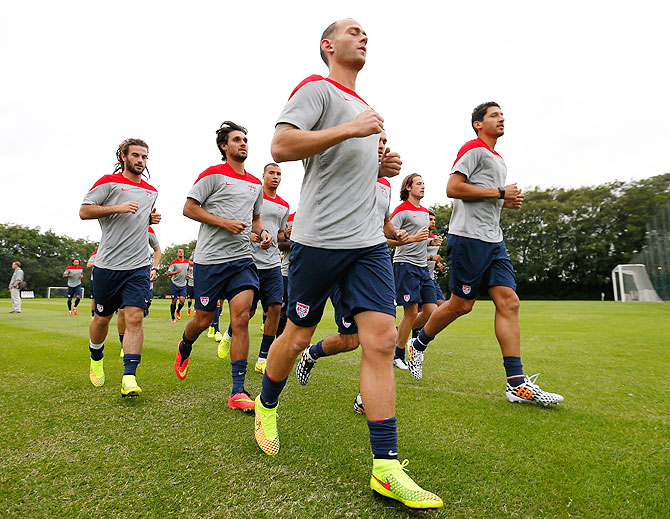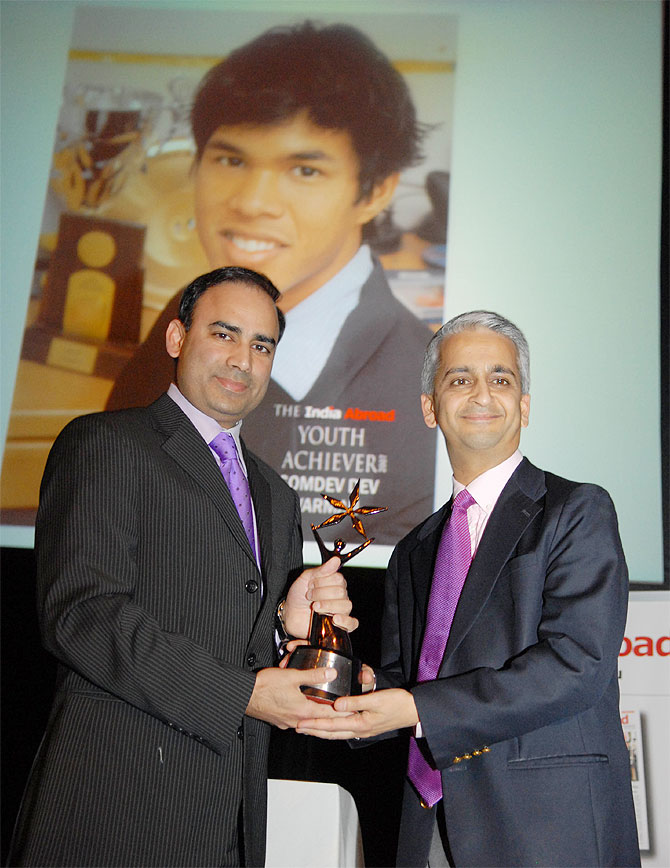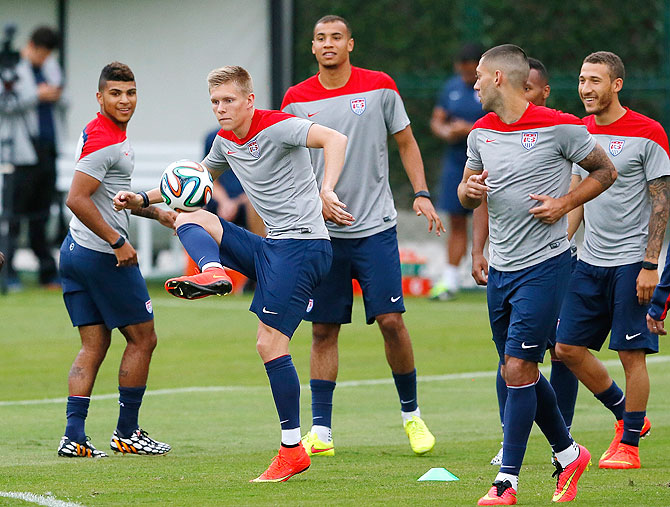Photographs: Kevin C. Cox/Getty Images Suman Guha Mozumder/Rediff.com
Columbia University Professor Sunil Gulati, President of the US Soccer Federation, speaks to Suman Guha Mozumder/Rediff.com about America's chances in the World Cup
Ahead of the World Cup kicking off in Sao Paolo, Brazil, June 12, one Indian American waiting agog for the games to begin is Columbia University Professor Sunil Gulati, president of the US Soccer Federation.
Indian Americans, especially those from West Bengal, Kerala or Goa, the states where football is most popular, have, of course, been always excited about the World Cup, but few have contributed so much for soccer’s improvement and popularization in the US than the 54-year-old professor of economics.
Gulati, also a member of FIFA's Executive Committee, left for Brazil last week and will be there until July 14. “The first ten days here are filled mostly with meetings, at both the CONCACAF (Confederation of North, Central American and Caribbean Association Football) and FIFA levels as well the Congresses for both organizations. Things change when the US team arrives June 9 and my focus starts to shift sharply to the games themselves. While I will attend many games in different venues, for me the US games are the centerpiece of the event,” Gulati told Rediff.com in an e-mail interview from Brazil.
After earning two master’s degrees in economics from Columbia, Gulati taught from 1986 to 1990 in the economics department and the School of International and Public Affairs.
After college, while running a national team development camp, Gulati told the then president of the US Soccer Federation, Werner Fricker, that the national team program had problems.
- ...
'We still have a way to go to get to the level of Brazil, Argentina'
Image: Sunil Gulati, President of the US Soccer Federation (right)Suman Guha Mozumder/Rediff.com
Fricker, Gulati recalled, asked him to send a note, but not a 17-page memo. Gulati sent Fricker exactly a 17-page memo and that memo earned him an invitation to improve the program and ultimately put him in a small group that crafted the successful US bid to host the World Cup in 1994.
“Look, we’ve made a lot of progress over the last 25 years -- 7 straight World Cups, a professional league that will have 21 teams next year with average attendance of 18k+, multiple soccer specific stadiums, better TV ratings than we’ve ever had, more US-based tickets buyers for the World Cup than the next three countries combined (excluding host country Brazil) — and we take great pride in those achievements,” Gulati said.
“We recognize, however, that soccer is a sport that is played seriously by 200+ countries and we still have a way to go to get to the level of Brazil, Argentina, Germany, and so on. However, if the next 25 years can replicate the success of the last 25, I’ll be a very happy guy and the timing (when the US can win the World Cup) will be a lot clearer!,” the Allahabad-born professor told this correspondent..
The 1994 World Cup, he said, provided the momentum needed to start Major League Soccer, the top professional men’s soccer league in North America. Gulati was one of the founding members of MLS, served as deputy commissioner and has watched interest grow since its first season in 1996.
- ...
Many have hailed Gulati for promotion of soccer in the US
Image: Aron Johannsson of the United States runs drills during their training session at Sao Paulo FC on MondayPhotographs: Kevin C. Cox/Getty Images Suman Guha Mozumder/Rediff.com
According to MLS, 2013 average attendance at games was 18,725 -- higher than that of the NBA or NHL.
How excited is he about June 12 when the World Cup kicks off?
The World Cup, Gulati said, is an extraordinary event for many reasons. “But when you are connected to a team, it’s perhaps different emotions at different times. As an FIFA executive committee member, I can say that the World Cup begins on June 12 in Sao Paolo and that is when the excitement starts. As US Soccer Federation president, the event starts in Natal June 16 against Ghana. That is when the nerves set in!” he said.
Many have hailed Gulati for promotion of soccer in the US.
Don Garber, MLS commissioner, feels Sunil Gulati is simply one of the most important and influential people in the world of soccer today. ‘The fact that an American occupies such a key role in the sport is a true testament to his longtime commitment to the game and provides our country with a voice in some of the key issues and opportunities affecting the game,’ he was quoted as saying by ColumbiaUniversity.
Gulati fell in love with soccer early in his life. It started as it does for many -- just as a player.
While he was in his teens, he also became a referee and a coach and even an administrator.
“In some ways the administration path is upside down since so many people get involved because their kids play. In some ways my kids started playing because of my love for the game -- I know they are both passionate. I was also attracted to the international aspect of the game and really got hooked when I spent a semester abroad in England during my undergraduate days,” Gulati recalled.
- ...
'We are in a very difficult group, but we are optimistic'
Image: Clint Dempsey of the United States enjoys a laugh with Aron Johannsson and Timothy Chandler during their training session at Sao Paulo FC on MondayPhotographs: Kevin C. Cox/Getty Images Suman Guha Mozumder/Rediff.com
The United States’ 23-player roster for the World Cup has already been announced. Gulati would not comment on the team's prospective performance, except saying that perhaps with the exception of Brazil, the first goal of every team is about getting through group play.
“In our case, we are in a very difficult group, but we are optimistic. We start with that -- plan on advancing -- and then it’s a knock out competition where everything is possible. I can assure you our coaches and players never step onto the field thinking about anything other than a win,” he said.
How does he juggle between soccer and economics?
“There is some cross over between my two passions -- teaching economics and soccer -- but generally they are distinct. Certainly my training in economics shapes the way I think about many issues, whether they be the use of statistical techniques to analyze problems, or in considering cost benefit as part of the decision making process or always thing about things ‘at the margin',” he said.
“The more obvious examples run in the opposite direction since I teach a sports economics seminar at ColumbiaCollege and in the last two years have taught a course in the management and economics of professional sports at the ColumbiaBusinessSchool,” he said.
Gulati's sports economics seminar is so popular that one year some students camped out for 40 hours to secure a spot in the class. In a course he teaches at the business school, Gulati touches on issues he currently faces at the US Soccer Federation.
While he understands that not every student is a sports buff, he sometimes uses sport for examples. ‘If I'm teaching about cartels, I might use an American sports league instead of OPEC,’ Gulati, who was born in India and raised in Connecticut, was quoted as saying by the university.
Does he like soccer more than economics and whether given a chance he would like to be in soccer fulltime or teach economics?
The professor was non-committal.
“Why would I choose? I’ve got the best of both worlds -- I get to do both on a full time basis!”





Comment
article